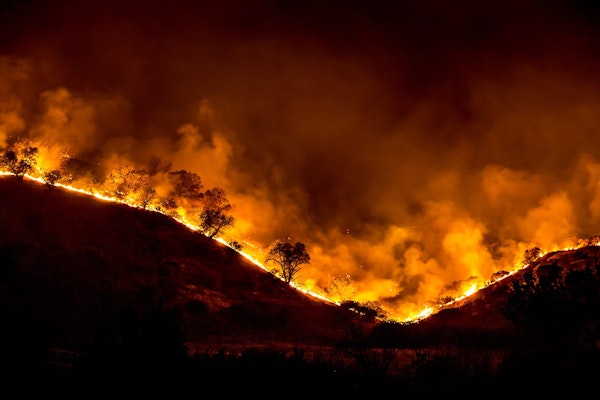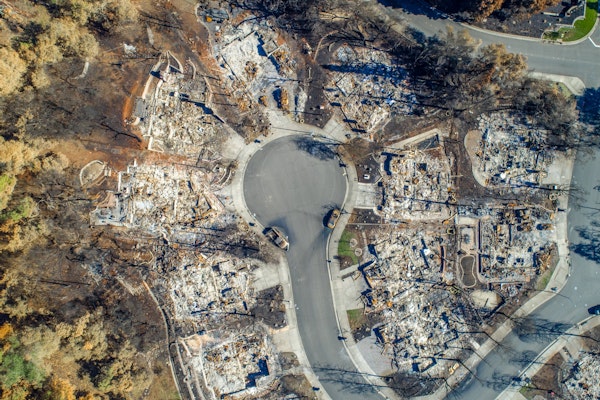
Mega Claims Reshape Workers’ Compensation Market in 2026
Higher medical costs, cumulative trauma litigation, and social inflation are driving severity and pressuring reserves, with California signaling a potential market shift.
February 12
Legislation & Regulation
Litigation
Risk Management
Technology
Workers' Compensation
California

Public Safety Power Shutoffs Expand Beyond California Amid Growing Wildfire Risk
Utilities across the West are increasingly cutting power during high-risk weather, reshaping wildfire prevention strategies and claims exposure for insurers.
February 9
Catastrophe
Insurance Industry
Legislation & Regulation
Liability
Property
California
Colorado
Nevada
New Mexico
Texas

Why Bloomberg Says Premium Caps Could Worsen the Homeowners Insurance Crisis
A Bloomberg editorial urges policymakers to focus on resilience, legal reform, and mitigation rather than capping rates or penalizing insurers as premiums climb nationwide.
February 6
Catastrophe
Insurance Industry
Legislation & Regulation
Litigation
Property
California
Florida
Illinois

California Climate Disclosure Laws Face First Amendment Test in Federal Appeal
Business groups argue California’s climate reporting mandates compel political speech and impose nationwide compliance burdens as the Ninth Circuit weighs constitutional limits.
February 2
Catastrophe
Insurance Industry
Legislation & Regulation
Litigation
Property
California

California Lawmakers Move to Regulate Aerial Imagery Used by Insurers
A proposal would require advance notice to homeowners and bar insurers from relying on aerial images older than 180 days when making coverage decisions.
January 12
Insurance Industry
Legislation & Regulation
Property
Risk Management
Technology
California

Why Casualty Claims Are Harder to Settle in 2026 Despite Market Stabilization
Rates may be leveling off, but jury behavior, litigation funding, and documentation demands continue to drive claim severity and settlement complexity heading into 2026.
January 12
Auto
Insurance Industry
Liability
Litigation
Property
California
Illinois
New York
Texas

California Court Revives $22.9M Insurance Fraud Lawsuit Alleging Attorney Aided Deception of GEICO
Appeals court says fraud claims may rely on public records without violating California’s public disclosure bar.
January 8
Fraud
Insurance Industry
Legislation & Regulation
Litigation
California
Colorado

California Bill Seeks to Fast-Track Wildfire Insurance Claims and Expand Policyholder Protections
SB 876 would mandate upfront claim payments, double ALE limits, and impose new timelines for insurers after wildfire disasters.
January 8
Catastrophe
Education & Training
Excess & Surplus Lines
Insurance Industry
Legislation & Regulation
California

California Marijuana Law Complicates Intoxication Defense in Work Injury Claims
Courts require more than a positive THC test to prove workplace marijuana impairment. Here’s what claims adjusters need to know post-AB 2188.
December 22, 2025
Fraud
Legislation & Regulation
Litigation
Risk Management
Workers' Compensation
California

CHP Officer in California Sentenced for Workers’ Comp Fraud After Disability Claim Unravels
A California officer faked a disabling injury while collecting benefits, only to be caught performing manual labor on his property. The case underscores the vigilance required in high-risk workers’ comp claims.
December 22, 2025
Fraud
Insurance Industry
Legislation & Regulation
Litigation
Workers' Compensation
California

Minnesota Jury Awards $65.5M in Johnson & Johnson Talc-Asbestos Cancer Case
A Minnesota woman was awarded $65.5 million after a jury linked her mesothelioma to long-term use of Johnson & Johnson’s talcum powder. The company plans to appeal.
December 22, 2025
Insurance Industry
Liability
Life & Health
Litigation
Risk Management
California
Minnesota

Wildfires and Hailstorms Drive $100B in Insured Losses Again in 2025
The 2025 Los Angeles wildfire was the costliest ever, but quieter, relentless storms caused even more damage nationwide. The result is soaring insurance costs and shrinking coverage options.
December 22, 2025
Catastrophe
Insurance Industry
Property
Risk Management
Underwriting
California
Florida
Texas

Most US Homes at Risk of Underinsurance Despite High Policyholder Confidence
A new survey finds most homeowners believe they’re fully covered for disasters like floods and wildfires, but industry data shows many lack essential protections.
December 12, 2025
Catastrophe
Education & Training
Insurance Industry
Property
Risk Management
Arizona
California
Florida
Louisiana
Nevada

Disney Sued Over Restrictive Disability Access Changes at Theme Parks
Disney faces legal and shareholder challenges over new limits to its disability access program, with critics arguing the company is denying necessary accommodations.
December 11, 2025
Insurance Industry
Legislation & Regulation
Liability
Litigation
Risk Management
California
Florida

State Farm Under Investigation Over $5B in California Wildfire Claims
California regulators and LA County are investigating delays, denials, and AI use in State Farm’s wildfire claims process after $5 billion in payouts.
December 11, 2025
Catastrophe
Legislation & Regulation
Technology
California




